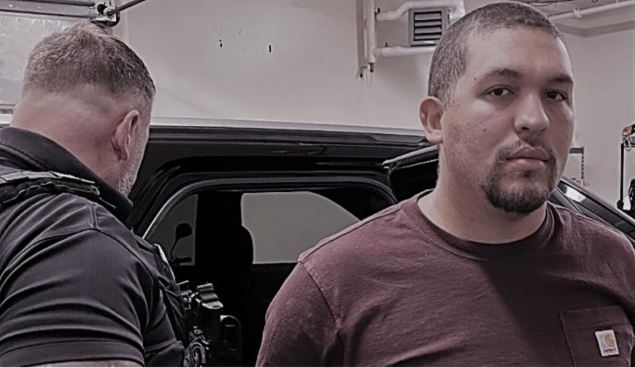
By Todd Bensman as published February 20, 2025 by the Center for Immigration Studies
A former state police officer in Brazil arrested and charged in Brazil for taking part in the murder of 11 teenagers but who still got into the United States on a tourist visa and stayed for years is the latest addition to the Center for Immigration Studies National Security Vetting Failures Database. The entry brings the total number of analyzed failure cases in the database to 52.
The addition of Antonio Jose De Abreu Vidal Filho (referenced in court records as “De Abreu”) comes at a moment when President Donald Trump has signed executive orders requiring repair and improvement to U.S. national security screening and vetting systems for all immigrant and non-immigrant visa applications. (See “Decoding Trump’s Border Counterterrorism Order, Part 2”.)
The Center launched the database in March 2023 to draw “remedial attention” to ongoing government vetting failures lest they “drift from the public mind and interest of lawmakers, oversight committee members, media, and homeland security practitioners who would otherwise feel compelled to demand process reforms”, according to an explanatory Center report titled “Learning from our Mistakes”.
‘The Slaughter of Curió’
In April 2014, De Abreu joined the Ceara State Military Police, which conducts first-line street policing. In the early morning hours of November 12, 2015, he was among a large group of fellow officers who participated in the so-called “Slaughter of Curió” massacre, which was a police-precipitated mass killing of teenagers from the impoverished neighborhoods of Barroso, Messejana, Guajeru, Curió, and Lagoa Redonda in the state capital of Ceara. The killings were in retaliation for the death of another police officer, who died trying to defend his wife who was being assaulted.
In total, the officers murdered 11 people, mostly teenagers, and seriously wounded or tortured many others. Brazilian authorities eventually arrested and charged a total of 35 perpetrators, including De Abreu, in a widely publicized sweep on August 31, 2016.
According to Brazilian press reports, the law enforcement perpetrators, off-duty, drove through neighborhoods in the city of Ceara indiscriminately selecting teenagers to kill at nine different locations. The gunmen would force their victims to kneel, then execute them by gunfire before driving on to find other victims. None of the victims apparently had any connection to the killing of the first state police officer.
Flight to the U.S. and Vetting Failure
De Abreu wasted little time plotting to flee Brazil when authorities inexplicably released him pending trial on May 24, 2017.
Just two weeks later, on June 9, 2017, De Abreu applied to the U.S. State Department for a non-immigrant B2 visitor visa, answering “no” under threat of perjury to questions as to whether he had ever been arrested for any offense or crime. The B2 visitor visa is valid for up to 10 years, allowing its holder to stay for up to six continuous months and to return after leaving the country during the decade.
“Official Brazilian court records, including De Abreu’s arrest record, are evidence that he was arrested and detained,” a U.S. government memorandum arguing for detention — years later — noted about the availability of information to adjudicators. “And the record of court proceedings corroborates the fact of his arrest and detention for the crimes described in the Indictment.”
State Department adjudicators apparently never checked with Brazilian authorities or conducted routine internet research, either of which would almost certainly have revealed his relatively recent arrest and charges for mass murder in Brazil, and thus resulted in a denial. Instead, State Department adjudicators quickly approved the visa on June 21, 2017, and as the Brazil prosecution approached, De Abreu flew to the United States on May 30, 2018.
Other U.S. adjudicators would repeatedly commit the same negligence later.
Extreme Danger to American Citizens
De Abreu settled in the Boston, Mass., area. He would comply with the visa by traveling back and forth to Brazil even while his murder prosecution was pending.
As the mass murder trial approached, on January 29, 2020, De Abreu filed an asylum application with U.S. Citizenship and Immigration Services (USCIS) in Boston, allowing him to stay for years and possibly permanently.
Again, he lied on all the government asylum application forms to conceal his arrest and charges for the Curió massacre. He applied for and obtained a state driver’s license, a Social Security card, travel documents, and employment authorization. None of the relevant authorities bothered to check with Brazil’s federal government either, including the Social Security Administration or other federal agencies.
The move meant that De Abreu was far away and safe from Brazilian justice on June 25, 2023, when the First Court of Fortaleza, Ceara, convicted him of 11 counts of murder, three counts of attempted murder, and four counts of physical and mental torture. That same day, De Abreu was sentenced to 275 years and 11 months in prison and an arrest warrant issued.
But his new American neighbors were not safe at all, U.S. prosecutors later argued in a motion for detention, sometime after ICE Homeland Security Investigations agents discovered him inside the United States.
“His subsequent conviction for eleven murders, demonstrates that he is a serious danger to the community,” the U.S. prosecutors argued. “The seriousness of the danger to others is enormous. The defendant has been convicted in Brazil of horrific acts of violence, and there is a significant risk that he will continue to engage in such conduct upon release on these charges.”
It’s unclear how U.S. authorities discovered De Abreu, though it’s likely they did after the Brazil trial when INTERPOL issued an international “Red Notice” arrest warrant for De Abreu and finally found him — and all of his Brazilian arrest and prosecution case records that somehow eluded State Department and USCIS visa adjudicators.
“We are proud to have taken this notorious criminal, convicted of participating in multiple heinous murders in Brazil, off our streets,” ICE Boston Field Office Director Todd Lyons said after the 2023 arrest.